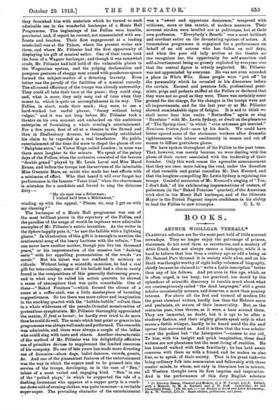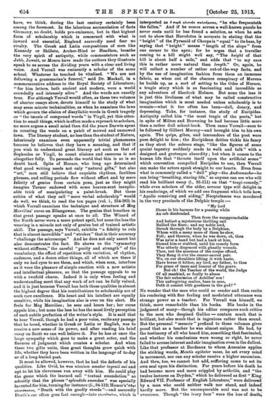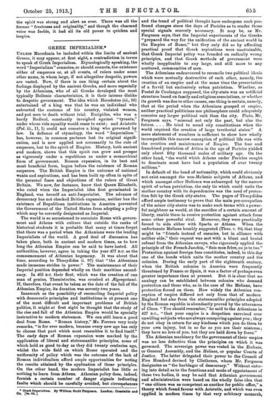BOOKS.
ARTHUR WOOLLGAR TERRALL.•
CLASSICAL scholars are for the most part held of little account nowadays. They no longer enjoy the patronage of princes, statesmen do not need them as secretaries, and a mastery of Attic Greek does not always ensure a bishopric, while it is hard to believe that less than a century ago so odd a being as Dr. Samuel Parr throned it in society while alive, and on his death was thought worthy of eight bulky volumes of biography, chiefly because he claimed to " write a Latin inscription " better than any of his fellows. And yet even in this age, which, as is often urged, is too busy, too practical, too dazed by the splendour of scientific discovery to trouble much about what are contemptuously called "the dead languages," still a great scholar occasionally arouses, and deserves, a more than passing interest. For above all the fret and turmoil of modern life the great classical writers, hardly less than the Hebrew seers and psalmists, sit secure of their immortality. But, as the. centuries pass, time throws, as it were, a haze around them. They are immortal, no doubt, but it is apt to be after a shadowy fashion, and their mighty ghosts speak only in what seems a feeble whisper, hardly to be heard amid the din and uproar that surround us. And it is then that the true scholar —not the pedant but "the Interpreter "—comes to our aid_ To him, with his insight and quick imagination, these dead writers are not phantoms but the most living of realities. He has himself walked with them familiarly ; he has held sweet converse with them as with a friend, and he makes us also free, so to speak, of their society. That is his great task—tor bring ordinary folk into communion and fellowship with those master minds, to whom, not only in literature but in science,. all Western thought owes its first impulse and inspiration. And in the performance of this duty English scholars • (I) Literary Essays, Classical and Modern, of A. W. Verrall, Litt.D. Edited,. with a Memoir, bL M. A. Bayfield and J. D. Duff. Cambridge: At the- University Press. 10s. 6d. net. j—(2) Studies in Greek and Latin Scholarship.. By A. W. Verrall, 'tt.D. Same editors, publishers, and price. Lave, we think, during the last century certainly been among the foremost. In the laborious accumulation of facts Germany, no doubt, holds pre-eminence, but in that highest form of scholarship which is concerned with what is inward and essential, England assuredly need fear no rivalry. The Greek and Latin compositions of men like Kennedy or Shilleto, Archer-Hind or Head-lam, breathe the very spirit of antiquity, while commentators such as Jebh, Jowett, or Monro have made the authors they illustrate speak to us across the dividing years with a clear and living voice. And Ferran was eminently a scholar of the same school. Whatever he touched be vitalized. " We are not following a grammarian's funeral," said Dr. Mackail, in a commemorative address to the Royal Society of Literature ; " for him letters, both ancient and modern, were a world crowdedly and intensely alive." And the words are exactly true. For although Verrall would often, as these two volumes of shorter essays show, devote himself to the study of what may seem minute technicalities, as when be examines the laws which govern the elision of dissyllabic words in Greek tragedy or " the tmesis of compound 'words " in Virgil, yet this atten- tion to small things, which is often made a reproach to scholars, no more argues a small mind than did the years Darwin spent in counting the weeds on a patch of mowed and unmowed lawn. The literary student, no less than the student of Nature, laboriously examines even apparently trivial phenomena because he believes that they have a meaning, and that if Sou wish to understand great literary art such as that of Sophocles or Virgil, to count elisions and caesuras is not altogether folly. To persuade the world that this is so is no doubt bard. Spite of Horace, who long ago determined that good writing needs not only "natural gifts," but also "art," men still believe that exquisite rhythms, faultless phrases, and rolling periods flow without effort and by mere felicity of genius from certain pens, just as they might imagine Turner endowed with some heaven-sent inexplic- able trick of manipulating a paint-brush. But these critics of what they call " mere verbal scholarship" would do well, we think, to read the ten pages (vol. i., 254-263) in which Verrall examines the technique and structure of Meg 11Ierrilies' curse on Ellangowan. The genius that breathes in that great passage speaks at once to all. The Wizard of the North never wove a more potent spell, but none the less the weaving is a miracle not only of genius but of trained artistic skill. The passage, says Verrall, exhibits " a fidelity to rule that is almost incredible" and " strokes " that in their accuracy " challenge the microscope." And he does not only assert but also demonstrates the fact. He shows us the "symmetry without stiffness," the careful "purity and strength" of the vocabulary, the effect of repetition with variation, of rhythm, cadences, and a dozen other things, all of which are there if only we had eyes to see them, and which, when seen, interfuse as it were the pleasure of simple emotion with a new artistic and intellectual pleasure, so that the passage appeals to us with a twofold charm. Indeed it is only when feeling and understanding meet that any work of art can be fully valued, and it is just because Verrall has both these qualities in almost the highest degree that his contributions to scholarship are of such rare excellence. His heart and his intellect are equally sensitive, while his imagination also is ever on the alert. He feels for Meg Merrilies ; he sees and hears her ; her curse appals him ; but none the less he has the most lively perception of each subtle perfection of the writer's style, It is said that to bear Yerrall, though he had a poor voice, recite any passage that he loved, whether in Greek or Latin or English, was to receive a new sense of its power, and after reading his brief essay on Scott we can well believe it. For he has at once the large sympathy which goes to make a great actor, and the fineness of judgment which creates a scholar. And when these two gifts unite, then great thoughts grow quick with life, whether they have been written in the language of to-day or of a long-buried past.
It must be allowed, however, that he had the defects of his qualities. Like Ovid, he was nimium amagor ingenii sui and apt to let his cleverness run away with him. He could play the game which the learned call " textual emendation" so adroitly that the phrase "spiendide emendax" was specially invented for him, turning for instance (ii., 84-1121 Homer'earais • avi.6ircoXos, " Death with the goodly steeds "—and assuredly Death's car often goes fast enough—intox X K ,LT_TW OS, which is interpreted as 4 rap& salvroirs woiAoLittrot, "be who frequenteth the fallen." And if he comes across a well-known puzzle be never rests until he has found a solution, as when he sets out to show that Herodotus is accurate in stating that the " height " of the Pyramid of Cheops is " equal " to its base, by saying that " height " means " length of the slope " from one corner to the apex; for he urges that a traveller coming to a bill might well say, " The height of that bill is about half a mile," and adds that "to my ears this is rather more natural than length." Or, again, he will collect a number of rather ontaof-the-way facts, and by the use of imagination fashion from them an immense fabric, as when out of the obscure conspiracy of Murena he builds up, as a sort of setting to the Odes of Horace, a tragic story which is as fascinating and incredible as any adventure of Sherlock Holmes. But none the less it is just this liveliness of what may be called constructive imagination which is most needed unless scholarship is to remain—what it too often has been—dull, dreary, and depressing. Take, for instance, the study of Euripides. Antiquity called him " the most tragic of the poets," but in spite of Milton and Browning be had become little more than a rather dull school-book. Then came Verrall—soon to be followed by Gilbert Murray—and brought him to hie own again. The quips, gibes, and innuendoes of the poet were pure delight to him ; the Euripidean deities tickle his fancy as they strut the solemn stage, "like the figures of some quaint tapestry suddenly made to walk and talk " with a designed and grotesque absurdity ; but when it comes to the human life that " thrusts itself upon the artificial scene" which convention compelled Euripides to use, then Verrall can make the actors speak straight to our hearts. Even from what is commonly called a " dull" play—the Andromache—be can bring "breathing, staring life," as anyone can see who will read his brilliant essay (i., &5-111) on that " tragi-comedy," while even scholars of the older, severer type will delight in his renderings, of which we add one fragment which tells how, " Apollo conniving and aiding," Neoptolemus was murdered in the very precincts of the Delphic temple :— "My lord
Shone in his harness for a passing while
An orb diselouded.
Then from the unapproachable And holiest a mysterious thrilling call Rallied the fliers ; and my noble lord, Struck through the body by a Delphian,
Whom with a many more of them he slew,
Fell; and thereon, when he was down, oh, then Was ne'er a hand but had a hack at him, Stoned him or stabbed, until his comely form Was utterly disgraced with ghastly wounds.
Then, lest the nearness of the corpse offend, They flung it o'er the censer-sacred pale. We, on our shoulders lifting it with haste, Have borne it hither, my lord, my father, to thee For grace of tears and honour of the grave.
But oh! the Teacher of the world, the Judge Of all mankind, so foully to abuse The fair submission of Achilles' son!
This unforgiving malice, base in man, Doth it consist with goodness in the god?"
No wonder that the man who could so render and then recite his rendering with fine feeling and modulated utterance won strange power as a teacher. For Verrall was himself, we think, more remarkable than his books. His books in the judgment of many—though his editor compares such critics to the men who despised Galileo — contain much that is brilliant, but also much that is ingenious rather than sound. But the personal " memoir " prefixed to these volumes gives proof that as a teacher he was almost unique. He had, by the testimony of all who heard him, something that fascinated, and whether his conclusions were wrong or right, he never failed to arouse interest and stir imagination even in the dullest. Like that professor at Bordeaux to whom Ausonius applies the striking words, Arenas agitator meae, he set every mind in movement, nor can any scholar receive a higher encomium. And then, too, we cannot but add, suffering came to set its own seal upon his distinction. For years before his death he had become more and more crippled by arthritis, and "the twelve lectures on Dryden," which he delivered as first " King Edward VII. Professor of English Literature," were delivered. by a man who could neither walk nor stand, and indeed hardly move. But the unconquerable soul was not to be overcome. Though "the ivory face" wore the hue of death;
the spirit was strong and alert as ever. There was all the former " freshness and originality," and though the charmed voice was feeble, it had all its old power to quicken and inspire.
















































 Previous page
Previous page